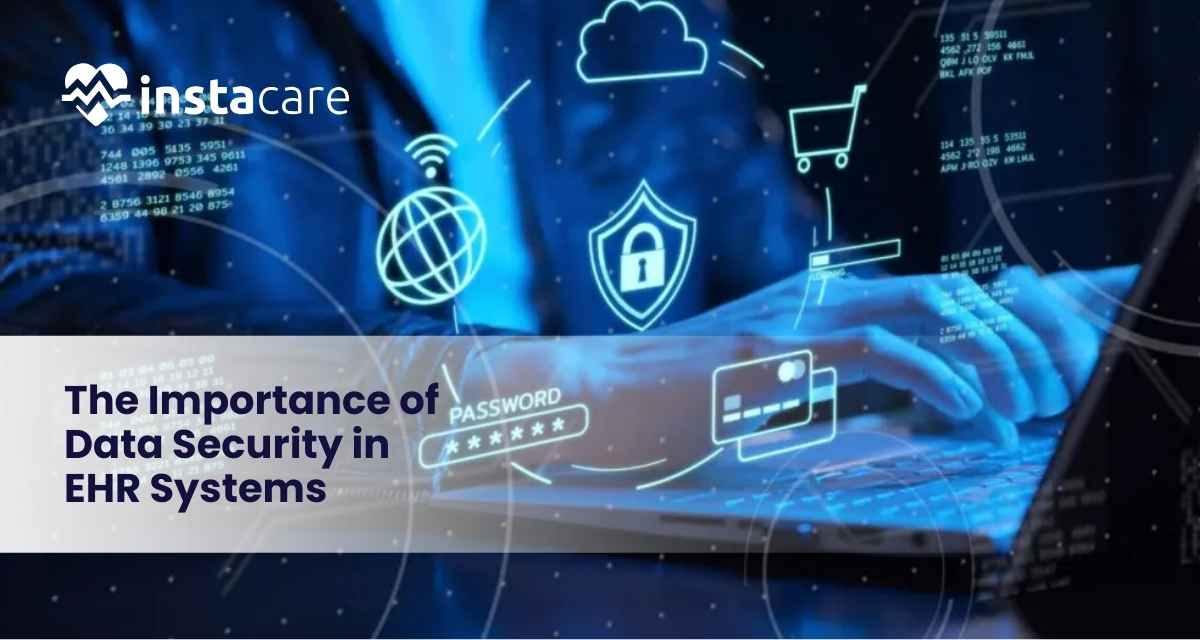Last updated on Tuesday, 15, October, 2024
Modernization of health care with the EHR system offers numerous benefits, including better patient care and efficient workflow and direct access to data. But with it also comes significant challenges: the most important is data security. Its protection does not only go beyond the law but also becomes a moral duty for healthcare providers in Pakistan. In this article we have discuss the requirements for data security in EHR systems, giving best practices to Pakistani health providers so that they could protect their patients’ data.
Table of Contents
EHR Systems Knowledge
EHR is the electronic version of a patient’s chart containing updated information as if it is a regular chart about what it comprises. New contents in this aspect include medical histories, treatment plans, medications, allergies, and lab and test results. The management systems of EHRs for patient information allow the healthcare provider to access this information smoothly. However, the electronic nature of EHRs makes them vulnerable to a series of security threats from data breaches to cyberattacks and unauthorized access.
Why Is Data Security Important in EHR Systems?
1-Confidentiality of Patient Information
One of the major reasons that will validate the case for data security being at the core of EHRs is that it ensures confidentiality about the patient. Information on diagnosis, treatment plans, and any other personal identifier should not be disclosed to anyone since this will ensure a patient’s trust. The disclosure of such information will lead to identity theft, discrimination, and emotional trauma for patients. The healthcare providers must therefore ensure that data security in EHR system is tight so that access is allowed by only registered personnel.
2-Adherence to Legislative Requirements:
In Pakistan, health care providers face a number of legislations related to data protection and privacy. Presently, the Personal Data Protection Bill is under consideration. Evidently, such an organization has to guard its personal data. Non-compliance with such legislation may attract penalty or legal action or loss of accreditation. So, by first protecting their data, the providers in health care would be able to achieve compliance with current legislation and with future legislation on the anvil.
3-Data Integrity
The information, which is gathered in healthcare premises, should be correct since erroneous or invalid information may lead to the inappropriate diagnosis and treatment of a patient. While barring unauthorized access for alteration is important, the protection of EHR ensures the quality of care. Methods for protecting EHR from unauthorized alteration include encryption, access controls, and audit trails.
4-Security from Cyber Attacks
Patient data is of high value, thus placing organizations in the health sector at risk of attacks. Ransomware has emerged whereby attackers encrypt the data owned by an organization and tell them that money needs to be paid for the release of that data. Therefore, effective cybersecurity measures shall immensely enhance the probability of avoiding the aforementioned attacks and prevent systems from being destroyed
5-Reputation and Confidence.
Due to data breaches, the reputation of healthcare organizations is greatly damaged. There is a good chance that the patients would place care with providers who demonstrate dedication towards securing data. Thus, healthcare providers, with the primary idea of protecting data, would be able to enhance reputation, gain patient trust, and build long-term relationships with clients.
Best Practices For Data Security in EHR Systems
1-Conduct Regular Risk Assessments
The frequency of risk assessments must be done consistently by the healthcare providers to identify vulnerabilities in the EHR systems. Proactive approaches allow organizations to develop potential weaknesses before nefarious actors begin to exploit them. Risk assessment entails physical security, network security, and personnel practices.
2-Robust access controls
Access controls are a way of limiting access to this sensitive patient information to only those authorized personnel. As such, healthcare organizations should install RBAC and ensure that employees only gain access to information which they require for their functions. Apart from MFA, it can also be used to add another layer of protection over the verification of identity by using more than one method for each user.
3-Encrypt Patient Data
The most important encryption will be data encryption, which will change any readable text into some unreadable text. This unreadable text can be decoded only through the special key. The patient’s data should be encrypted both in transit as well as at rest by the healthcare provider. Thus, there is safety of data from access through interception or theft.
4-Employee training
The primary reason for most data breaches in health care. Thus, healthcare providers need to train their employees on best practices in data security. These include how to tell phishing attempts, strong passwords, and data privacy.
5-Monitoring and auditing access logs
Monitoring and auditing access logs will enable the providers to identify any attempted access to the database made from unauthorized accounts. Access attempts will be identified from malicious accounts, and possible security breaches will be ascertained. The organizations will make use of automated monitoring systems in order to respond within the shortest time possible to suspicious activities.
6-Incident Response Plan
An incident response plan is the procedure that health service providers must undertake in the case of a breach or security incident. Measures to be addressed include what actions to take if the breach occurs, who to communicate with, and who to inform about the incident. This plan formed will present methodologies on how to contain the breach, communicate the problem to the parties involved, and notify authorities about the same. A well-designed incident response plan will reduce the impact of a security breach and enable swift recovery.
7-Software update and patching
The security of the EHR system needs updating of its software. It should maintain a routine for making software updates and patches of known vulnerabilities. It’s an opportunity that if not taken may make it vulnerable to attacks.
8-Physical Access to Systems
Equally, safety from the physical aspect of EHR systems must provide digital safety. Healthcare providers must employ measures that deny physical access to servers and workstations with patient information. This can be done through access cards, biometric scanners, and surveillance cameras.
9-Consultation with IT Security Experts
More often than not, healthcare organizations need to liaise with IT security experts to improve data security measures. These can give insight into the latest security technologies, best practices, and compliance requirements allowing an organization to be ahead of potential threats.
10-Patient Involvement in Data Security
Thus, it is the role of patients to contribute towards the security of their health information. For this reason, it is the responsibility of healthcare providers to educate these patients regarding their rights to data privacy and motivate them towards proactive steps, such as having strong passwords on the patient portal and alerting vigilantly when suspicious activities arise.
Conclusion
Again, the issue of protection of patient information in EHR systems becomes a concerning matter for Pakistani healthcare providers. They will protect sensitive patient information, satisfying part of their legal compliance and earning trust and a good reputation amongst the stakeholders. Best practices that include not holding a risk assessment continuously, access control measures, encryption of data, and staff training will do the trick in protecting patient data and the integrity of healthcare services.
FAQs
1-What are EHRs and why do they matter for healthcare providers?
EHRs form the digital version of the paper chart and comprise all information concerning a patient’s comprehensive medical history, treatment plans, laboratory test results, and so forth. They are important because they improve patient care, coupled with streamlining processes along with easy access to data for healthcare providers.
2-What would be the effects of a failure in a health care information breach?
The following are identity theft, discrimination, legal penalties against one for failure to comply, and damage to the reputation of a health provider. Of course, such breaches will also emotionally hurt the victims of the breach.
3-What practices must healthcare providers ensure in their treatment of any private information?
Robust data security measures ensure that healthcare providers are compliant. Periodical proper risk assessments need to be held, and staff need to be trained on data protection practices. Steps to be taken in case of an actual breach must be developed and instituted as an incident response plan. Keeping abreast of what the current regulations are puts one under a mandate to comply.



